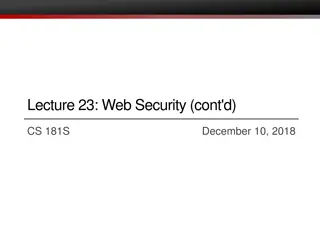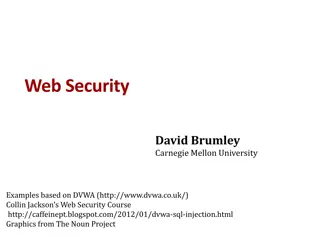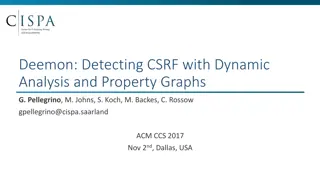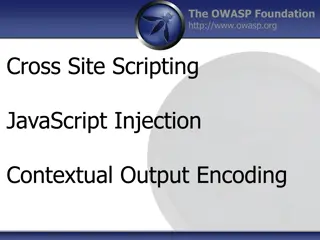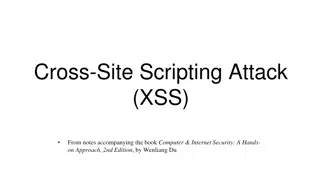Understanding Network Security Fundamentals and Common Web Application Attacks
Learn about the basics of network security, including common web application attacks such as Cross-Site Scripting (XSS), SQL Injection, and Session Hijacking. Explore important concepts like cookies, markup languages, and ways to enhance security to protect against cyber threats.
0 views • 11 slides
Exploring Web Application Vulnerabilities and JavaScript Worms
Web applications face pervasive vulnerabilities, with Cross-site Scripting (XSS) leading the threats. The domination of XSS and buffer overruns has enabled the propagation of JavaScript worms, exemplified by infamous cases like Samy's MySpace outbreak. These exploits, marked by obfuscation and polym
1 views • 20 slides
Understanding Web Security Fundamentals in Networking
This lecture delves into the intricate layers of web security, focusing on vulnerabilities by year, CSRF attacks, and defensive strategies. Topics covered include the application layer, networking stack, HTTP protocols, and common security threats like XSS and SQL injection. Various defense mechanis
0 views • 27 slides
Building a Security Culture: Strategies and Case Studies
Explore insights shared by industry experts on establishing a security culture within organizations, including building buy-in from founders, integrating threat modeling, leveraging secure frameworks, and learning from real-life case studies like Cross-Site Scripting (XSS) vulnerabilities and preven
0 views • 28 slides
Understanding Web Security Threats and Vulnerabilities
Explore different aspects of web security including injection flaws, malicious client-server interactions, and techniques used by attackers such as clickjacking and phishing. Gain insights into common threats like Cross-Site Scripting (XSS) and Broken Access Control, and understand how to protect we
0 views • 74 slides
Understanding Web Application Vulnerabilities in Information Warfare
Web application vulnerabilities such as Cross-Site Scripting, SQL Injection, and Broken Authentication pose significant risks in information warfare. Current solutions include Black-Box Security Testing and XSS Analyzers, but they have limitations like static verification and dependence on security
0 views • 21 slides
Detecting CSRF with Dynamic Analysis and Property Graphs
This content discusses the challenges and techniques involved in detecting Cross-Site Request Forgery (CSRF) through dynamic analysis and property graphs. It emphasizes the importance of understanding application states, request parameters, and state transitions to combat popular security risks like
0 views • 16 slides
Hunting Cross-Site Scripting Attacks in the Network
Detect suspicious URLs and prevent XSS attacks with xHunter, a tool by Elias Athanasopoulos and team at FORTH-ICS, Greece. Explore the motivation, current status, targets, and orchestration of XSS incidents. Learn about the anatomy of XSS exploits and the operation of xHunter in identifying JavaScri
0 views • 48 slides
Understanding Web Security: Same-Origin Policy in Web Applications
In web development, the Same-Origin Policy plays a crucial role in ensuring the security of web applications by restricting how documents or scripts loaded from one origin can interact with resources from another origin. This policy helps prevent malicious attacks such as Cross-Origin Request Forger
0 views • 25 slides
Understanding HTTP Security Headers for Web Apps
Explore the importance of HTTP security headers on web applications through a detailed breakdown of headers like HSTS, XFO, XSS, CSP, CTO, RH, and FP. Learn how these headers enhance security by instructing browsers on handling website content, preventing various attacks. Gain insights on configurin
0 views • 68 slides
Basic Web Security Model for Secure Electronic Commerce
This presentation covers the basic web security model for secure electronic commerce, focusing on vulnerabilities such as XSS and SQL injection. It discusses the decline in web vulnerabilities since 2009 and explores reported web vulnerabilities. The course theme includes topics like web application
0 views • 38 slides
Comprehensive Guide on XSS Attacks and Defense Strategies
Explore the intricate details of Cross-Site Scripting attacks, the anatomy of XSS attacks, safe ways to represent dangerous characters in web pages, defense mechanisms based on data types and contexts, and the significance of encoding and output handling. Learn how attackers misuse XSS to hijack ses
0 views • 32 slides
Understanding WebKit: A Comprehensive Overview
Explore the nuances of WebKit, a powerful web content rendering engine, delving into its history, components, and capabilities. Discover how WebKit ports have made it highly portable, as well as its core elements like WebCore, JavaScriptCore, and more. Unravel the mystique behind JavaScriptCore's de
0 views • 27 slides
Web Application Vulnerabilities: A Growing Concern
Web application vulnerabilities like code injection, SQL injection, cross-site scripting (XSS), and cross-site request forgery (CSRF) are becoming more common, posing serious threats to online security. Developers must tackle the complexity of filtering input and ensuring secure code to prevent mali
0 views • 23 slides
Understanding Cross-Site Scripting (XSS) Attacks and Prevention Measures
Cross-Site Scripting (XSS) is a prevalent security vulnerability in web applications that allows attackers to inject malicious scripts, potentially leading to unauthorized data access or manipulation. The content covers types of XSS attacks, finding vulnerable websites, testing exploits, and legal i
0 views • 10 slides
Understanding Cross-Site Scripting (XSS) Attacks
Learn about the dangers of Cross-Site Scripting (XSS) attacks, including Reflected and Persistent XSS types. This malicious practice allows attackers to inject harmful code into websites, potentially compromising user data and security measures. Discover how XSS attacks work, their impact on online
0 views • 38 slides
Exploring OWASP Top 10 Security Issues Evolution
Delve into the evolution of OWASP Top 10 security issues from 2010 to 2013, examining the key vulnerabilities such as injection, broken authentication, XSS, and more. Understand the assumptions and actions needed to address these critical security concerns effectively.
0 views • 45 slides


